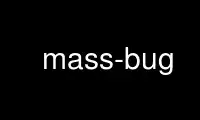
This is the command mass-bug that can be run in the OnWorks free hosting provider using one of our multiple free online workstations such as Ubuntu Online, Fedora Online, Windows online emulator or MAC OS online emulator
PROGRAM:
NAME
mass-bug - mass-file a bug report against a list of packages
SYNOPSIS
mass-bug [options] --subject="bug subject" template package-list
DESCRIPTION
mass-bug assists in filing a mass bug report in the Debian BTS on a set of packages. For
each package in the package-list file (which should list one package per line together
with an optional version number separated from the package name by an underscore), it
fills out the template, adds BTS pseudo-headers, and either displays or sends the bug
report.
Warning: Some care has been taken to avoid unpleasant and common mistakes, but this is
still a power tool that can generate massive amounts of bug report mails. Use it with
care, and read the documentation in the Developer's Reference about mass filing of bug
reports first.
TEMPLATE
The template file is the body of the message that will be sent for each bug report,
excluding the BTS pseudo-headers. In the template, #PACKAGE# is replaced with the name of
the package. If a version was specified for the package, #VERSION# will be replaced by
that version.
The components of the version number may be specified using #EPOCH#, #UPSTREAM_VERSION#
and #REVISION#. #EPOCH# includes the trailing colon and #REVISION# the leading dash so
that #EPOCH#UPSTREAM_VERSION##REVISION# is always the same as #VERSION#.
Note that text in the template will be automatically word-wrapped to 70 columns, up to the
start of a signature (indicated by '-- ' at the start of a line on its own). This is
another reason to avoid including BTS pseudo-headers in your template.
OPTIONS
mass-bug examines the devscripts configuration files as described below. Command line
options override the configuration file settings, though.
--severity=(wishlist|minor|normal|important|serious|grave|critical)
Specify the severity with which bugs should be filed. Default is normal.
--display
Fill out the templates for each package and display them all for verification. This is
the default behavior.
--send
Actually send the bug reports.
--subject="bug subject"
Specify the subject of the bug report. The subject will be automatically prefixed with
the name of the package that the bug is filed against.
--tags
Set the BTS pseudo-header for tags.
--user
Set the BTS pseudo-header for a usertags' user.
--usertags
Set the BTS pseudo-header for usertags.
--source
Specify that package names refer to source packages rather than binary packages.
--sendmail=SENDMAILCMD
Specify the sendmail command. The command will be split on white space and will not
be passed to a shell. Default is /usr/sbin/sendmail.
--no-wrap
Do not wrap the template to lines of 70 characters.
--no-conf, --noconf
Do not read any configuration files. This can only be used as the first option given
on the command-line.
--help
Provide a usage message.
--version
Display version information.
ENVIRONMENT
DEBEMAIL and EMAIL can be set in the environment to control the email address that the
bugs are sent from.
CONFIGURATION VARIABLES
The two configuration files /etc/devscripts.conf and ~/.devscripts are sourced by a shell
in that order to set configuration variables. Command line options can be used to
override configuration file settings. Environment variable settings are ignored for this
purpose. The currently recognised variables are:
BTS_SENDMAIL_COMMAND
If this is set, specifies a sendmail command to use instead of /usr/sbin/sendmail.
Same as the --sendmail command line option.
COPYRIGHT
This program is Copyright (C) 2006 by Joey Hess <[email protected]>.
It is licensed under the terms of the GPL, either version 2 of the License, or (at your
option) any later version.
Use mass-bug online using onworks.net services
